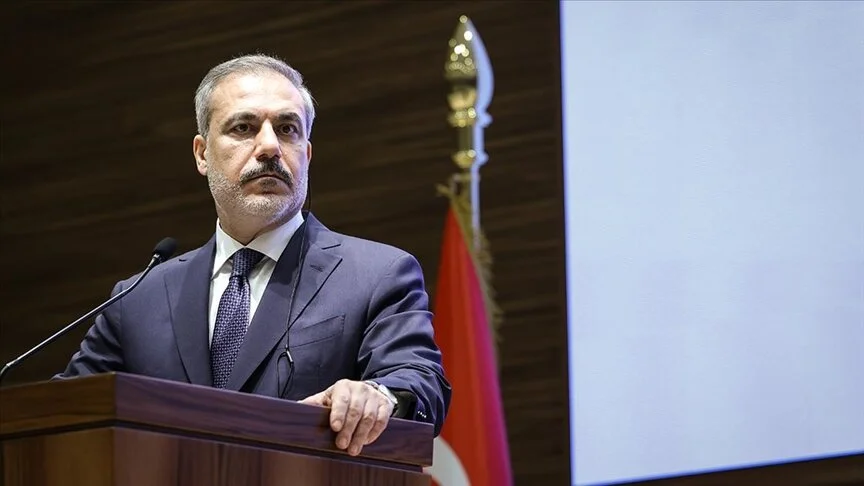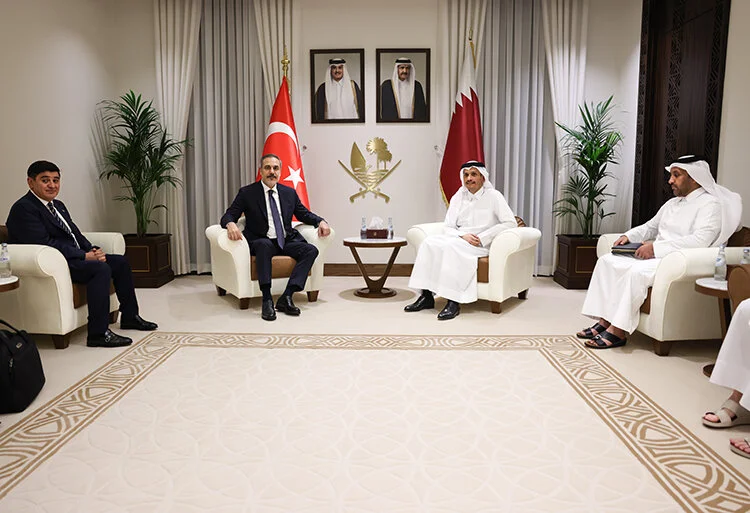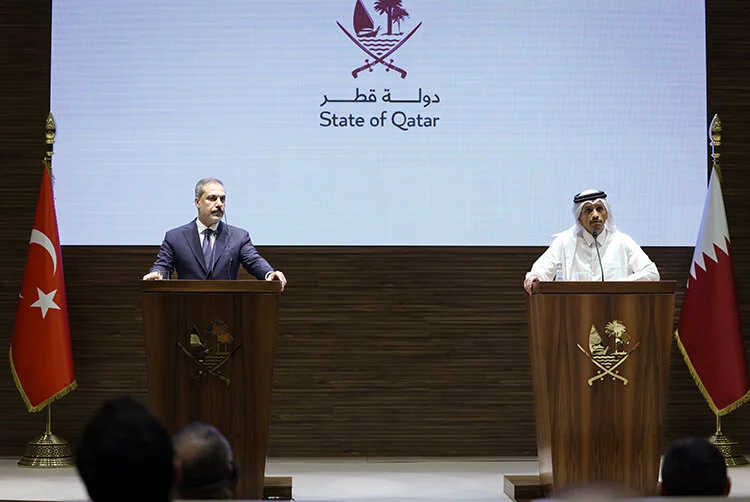
Minister of Foreign Affairs Fidan: We do not want third parties to transfer their conflicts to this geography.
Minister of Foreign Affairs Fidan: We do not want third parties to transfer their conflicts to this geography.
Foreign Minister Hakan Fidan said: "As countries of the region, we do not want third parties to transfer their conflicts to this geography."

Fidan spoke at a joint press conference with Qatari Prime Minister and Foreign Minister Mohammed bin Abdul Rahman Al Thani after their meeting in Qatar.
Stating that they discussed the latest developments in the region with their Qatari counterpart, Fidan said: "We have stated from the very beginning that the crimes committed by Israel in Gaza carry the risk of escalating into a regional conflict, and we warned of the possibility of escalation and proliferation."
Noting that what happened last weekend showed everyone that the possibility of a war involving non-regional countries is not far off, Fidan said that this risk still persists.
Stating that they had made great efforts to overcome tensions in a controlled manner before the events began, Fidan said that there had been some meetings, these efforts were still ongoing, and that they had conveyed their messages of restraint to all interested parties.
Noting that non-regional countries should also take a cold-blooded approach to what is happening, Fidan said: "As countries of the region, we do not want third parties to transfer their conflicts to this geography."
Noting that the events of April 13 revealed very important lessons, Fidan said: "First of all, international law is binding on everyone. The key to peace and stability at the global level is respect for international law. Secondly, it is obvious that (Israeli Prime Minister Benjamin) Netanyahu is trying to drag our region into a war in order to stay in power. Those who unconditionally support Netanyahu urgently need to reconsider their position. Thirdly, and most importantly, the violence and brutality committed by Israel in Gaza are at the heart of the events. I would like to emphasize that neither Israel nor Iran are victims at the moment. The victims are Gazans."
Fidan noted that everyone should do more to put an end to the disaster in Gaza.
Fidan thanked his Qatari counterpart Al Thani for the hospitality and said that they have very intensive and qualified coordination with Al Thani in terms of relations and regional issues between the two countries, and that they constantly work together on regional issues.
Fidan stressed that relations between Turkey and Qatar, as well as the bonds of friendship and brotherhood between the two peoples, have reached an exceptional level over the past 10 years, and stated that the basis of this cooperation is the strong will of President Recep Tayyip Erdogan and Emir of Qatar Sheikh Tamim bin Hamed Al Thani.
Recalling that the ninth meeting of the Supreme Strategic Committee was held in Doha under the chairmanship of the leaders of the two countries, Fidan said that the next meeting will be held in Turkey at the end of this year.
Also noting that at today's talks there is an opportunity to comprehensively discuss economic and trade cooperation between the two countries, Fidan said that, in their opinion, they can achieve the trade volume target of $5 billion in the short and medium term.
Noting that they discussed investments and the possibility of further deepening existing cooperation in areas such as tourism and energy, Fidan recalled that the Agreement on Trade and Economic Partnership was approved by the Grand National Assembly of Turkey in February.
Also saying that this agreement will create a significant acceleration in achieving goals in trade and economic relations, Fidan said that the decision to resume negotiations on a free trade Agreement between the Gulf Cooperation Council (GCC) and Turkey will facilitate trade with Qatar.
Fidan stated that they would continue to work with Qatar and other member countries to strengthen institutional relations with the GCC, and that during the talks they also discussed cooperation in the military and defense industries.
Fidan also stated that they had the opportunity to evaluate the activities of the Turkish-Qatari joint command of the joint forces in Doha.
"Countries that have influence on Israel must put an end to Israel"
Stating that it is extremely important for Israel to strictly comply with UN Security Council Resolution 2728 and the precautionary measures taken by the International Court of Justice, Fidan said: "An immediate and permanent ceasefire must be achieved as soon as possible. Humanitarian aid must be allowed. After that, we must immediately take steps to implement the two-State solution. We have seen that Western countries have been able to react with one voice against Iran. Now, in the same way, countries that have influence over Israel, especially the United States, must take a common position and stop Israel."
Fidan noted that he and his colleague Al Thani assess additional joint steps that can be taken to heal the wounds of their Palestinian brothers, adding that Turkey supports Qatar's efforts to cease fire.
Expressing gratitude to Al Thani for his efforts in this direction, Fidan said that the Emir of Qatar, Sheikh Tamim, Foreign Minister Al Thani and his colleagues had made great efforts, and that Turkey appreciated it.
Stressing that they will continue to work to ensure that this process does not harm the inalienable rights and future of the Palestinian people, Fidan stressed that all these events once again show the importance of establishing inter-Palestinian unity.
Noting that they see great advantages in the constructive attitude of all parties towards this goal, Fidan said: "Our ultimate goal is to establish a just and lasting peace. We will continue to advocate the creation of an independent and sovereign Palestinian State within the 1967 borders with East Jerusalem as its capital. I hope that this visit will be useful for the Palestinian people, relations between Turkey and Qatar and our region.
" "There is very intensive coordination between Qatar and Turkey"
Fidan stated that there is a very intensive coordination mechanism between Turkey and Qatar, especially with regard to the current crisis in the Palestinian issue, and that these meetings are held both at the political level and between other institutions, and that meetings continue at the leadership level.
Noting that they are in constant coordination with Al Thani, both through the Contact Group established within the framework of the Organization of Islamic Cooperation (OIC) and through bilateral meetings, Fidan said: "Turkey and Qatar are two of the few countries that have healthy relations with Hamas. Therefore, we are making every effort to do everything in our power, especially in the framework of the ceasefire negotiations that are currently underway. In particular, we regularly consult on how we can support the efforts of our Qatari brothers and our Egyptian brothers."
Fidan noted that in most cases, especially representatives of the West and other global public interests, come into contact with Turkey, and said: "We are asked for our opinion on certain issues, and we are asked to intervene in certain issues. I don't want to go into details. At the same time, we are in constant coordination with our Qatari brothers. In particular, they play an important role in the implementation of the ceasefire agreements, how can we support this role, how can we contribute in a different way, and this is our goal at the moment."
Noting that there is serious coordination between Turkey and Qatar in terms of humanitarian assistance, Fidan said they exchanged strategic views on what can be done to prevent the spread of conflict and prevent the spread of conflict in the region.
Fidan stated that they are working intensively to create a common strategy and opinion, especially between the two countries and with other countries friendly to Turkey, and said that they are constantly working on how to bring these studies to other stakeholders, world public opinion and other political actors, especially the United Nations.
Regarding the coordination between Qatar and Turkey, Fidan said, "The coordination between us is very intense and continuous."
Meeting with Haniyeh, head of the Hamas Political Bureau
Fidan said that he had a three-hour meeting with Haniyeh and other Politburo leaders in connection with his meeting with Hamas Politburo Chairman Ismail Haniyeh and his delegation, and that they conveyed to Haniyeh their condolences and greetings from President Erdogan.
Fidan said that during the meeting they focused on several issues, and that negotiations on the ongoing ceasefire, which were the subject of their conversations with his colleague Al Thani, were the most important of them.
Fidan noted that they had an intensive exchange of views on what is the point of view and position of Hamas and how it assesses the current situation in these negotiations, adding that Turkey also shares its own views.
Noting that Turkey is making intensive efforts together with Qatar and other countries to resolve the issue of two states, Fidan said: "We believe that if there is any benefit that will come out of this tragedy and the martyrdom of more than 30 thousand people, it will be the establishment of lasting peace in the region through a decision on two states."
Fidan stated that they are making great efforts for this and continued his words as follows:
"At the same time, we see that many players, especially in the West, who sympathize with this idea and want to support it, have concerns about Hamas. Unfortunately, we see that attempts by Israeli propaganda against Hamas to characterize Hamas as a terrorist organization similar to Daesh, rather than portray it as a national resistance movement, have found support in the West and in the eyes of some actors of international public opinion. During our meetings with Hamas representatives, we exchanged views on the need for them to clearly express their views and expectations, especially regarding the two-State solution and the solution leading to the creation of a Palestinian State, in order to eliminate such perceptions.
I have talked about this before and at meetings with Western colleagues. During our political negotiations with Hamas over the years, they informed me that they agreed to the establishment of a Palestinian State within the 1967 borders, and that after the establishment of a Palestinian State, Hamas would no longer need an armed wing, and that they would continue their life as a political party. In fact, I think this is an extremely important signal for the step that the world community will take on the path to a Palestinian State. I am glad to receive such messages from them today."
